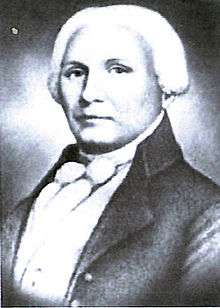Joseph McDowell Jr.
Joseph "Quaker Meadows" McDowell Jr. (8 March 1756 – 5 February 1801) was an American planter, soldier, and statesman from North Carolina. He was known as "Quaker Meadows Joe" to distinguish him from his cousin Joseph "Pleasant Gardens" McDowell, who was also a legislator and American Revolutionary War officer from North Carolina. The two men are not always clearly distinguished in historical records; both were in the 1780 Battle of Kings Mountain, one as a major in the Burke County Regiment of the North Carolina militia, and the other in a subordinate role as a captain.
Joseph McDowell, Jr. | |
|---|---|
 Joseph McDowell, Jr., US Representative from North Carolina | |
| Born | March 8, 1756 Winchester, Colony of Virginia |
| Died | February 5, 1801 (aged 44) Burke County, North Carolina |
| Place of burial | Quaker Meadows Cemetery, Morganton, North Carolina |
| Allegiance | United States of America |
| Service/ | North Carolina militia |
| Years of service | 1776-1783 |
| Rank | Colonel |
| Unit | 2nd Rowan County Regiment, Burke County Regiment |
| Commands held | Burke County Regiment |
| Spouse(s) | Margaret Moffett McDowell |
| Relations | BG Charles M. McDowell (brother), Captain Joseph "Pleasant Gardens" McDowell (cousin) |
Early life
McDowell was born in Winchester, Virginia, on February 15, 1756. His parents were Joseph McDowell, Sr. (1715–1771) and Virginia Margaret O'Neil (1717–1790). The family moved to Rowan County, North Carolina in 1758. He grew up on his family's estate, "Quaker Meadows", in Rowan County, North Carolina (in the area that became Burke County in 1777).[1][2]
Congressional service
He was a delegate to the Hillsborough Convention in 1788 and the Fayetteville Convention in 1789 that approved the U.S. Constitution for North Carolina.[3] McDowell served in the 5th United States Congress from 1797 to 1799. He is sometimes credited as also having served in the 3rd United States Congress (1793–1795), but according to the Biographical Directory of the United States Congress, it was his cousin, Joseph "Pleasant Gardens" McDowell, who served at that time. His son Joseph J. McDowell also served in Congress.[1]
Military service
He served in the North Carolina militia during the American Revolution.[4]
- Major in the 2nd Rowan County Regiment of the North Carolina militia (1776-1777)
- Major in the Burke County Regiment of the North Carolina militia (1777-1781)
- Lt. Colonel in the Burke County Regiment of the North Carolina militia (1781-1782)
- Colonel over the Burke County Regiment of the North Carolina militia (1782-1783)
Known engagements that he participated in included:[4]
- April 10-20, 1779 Chickamauga Towns
- June 20, 1779, Battle of Stono Ferry, South Carolina
- July 15, 1780, Earle's Ford, South Carolina
- June 20, 1780, Battle of Ramseur's Mill
- August 18, 1780, Battle of Musgrove's Mill, South Carolina
- September 12, 1780, Battle of Cane Creek/Lindley's Mill
- October 8, 1780, Battle of Kings Mountain, South Carolina
- January 17, 1781, Battle of Cowpens, South Carolina
- 1782, Cherokee Expedition
Death
McDowell died February 5, 1801 in Burke County, North Carolina. He was buried at the Quaker Meadows Cemetery, Morganton, Burke County, North Carolina.[1][4]
References
- "Congressional biography of Joseph McDowell". Retrieved March 30, 2019.
- "The Great Joseph Controversy". Retrieved March 30, 2019., about the confusion of the two Joseph McDowells
- "Minutes of the North Carolina Constitutional Convention at Fayetteville". Documenting the South. 1789. Retrieved July 23, 2019.
- Lewis, J.D. "Joseph McDowell". The American Revolution in North Carolina. Retrieved March 30, 2019.
- Dictionary of American Biography
- Purcell, L. Edward. Who Was Who in the American Revolution. New York: Facts on File, 1993. ISBN 0-8160-2107-4.
| U.S. House of Representatives | ||
|---|---|---|
| Preceded by James Holland |
Member of the U.S. House of Representatives from North Carolina's 1st congressional district 1797–1799 |
Succeeded by Joseph Dickson |